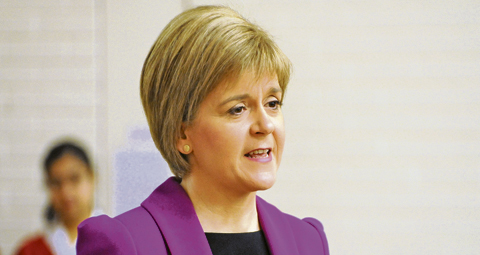March 6 | ![]() 0 COMMENTS
0 COMMENTS ![]() print
print

Focused on a fairer future for Scotland
The third in a series of interviews with Scottish political party leaders sees SCO editor LIZ LEYDON speaks to the First Minister and Scottish National Party leader Nicola Sturgeon on issues such as life, education and Scotland’s future
In a society obsessed with appearance, image and every detail of the lives of public figures, even politicians, Nicola Sturgeon is seen as tiny. Labour’s Jim Murphy is perceived as angular and sharp-witted, the Green’s Patrick Harvie as eco-gregarious, and the First Minister is not just trim, or petite, but tiny. Yet this MSP has all the strength of an Ayrshire woman with strong Glasgow constituency ties. And she knows and speaks her own mind.
Meeting the First Minister in her inaugural year, and in the run up to a UK general election, it seemed at first that there might not be enough time to cover the issues. But Ms Sturgeon makes time. That is what First Ministers do.
We met in the SNP headquarters near the Scottish Parliament in Edinburgh. The room was sun-bathed and her reception was warm in spite of the February chill outside and the tough talking ahead.
Although surrounded by SNP memorabilia, including a selection of Saltires, a strong Alex Salmond presence and a quirky ‘Margaret Thatcher has Scotland’s oil’ caricature, Ms Sturgeon was not distracted. And, in spite of last year’s referendum result, nor was she downtrodden or defeated.
“The outcome of the referendum may not be what I wanted, but there is no doubt that it has changed Scotland for the better,” she said. “Scotland today is stronger for it. Our democracy is strong and Scotland is a more confident country.”
As for a future referendum: “That is for the public to decide.”
Life
Like many politicians before her, including those featured in the SCO in this series so far, Ms Sturgeon’s views on abortion are widely known—generally supportive of the status quo in terms of time limits and at odds with Catholic teaching that life is a sacred gift from God. She believes, however, that abortion should be a devolved issue as ‘decisions about Scotland are best taken in Scotland.’
“Any votes on abortion, however, are down to conscience and members should not be whipped,” she added.
Speaking about the right of medical professionals to a conscience clause on abortion, such as the Catholic midwives whose case was recently rejected at the Supreme Court, Ms Sturgeon said doctors and nurses should and do have the right to conscientiously object under the Abortion Act 1967.
“Recent cases have been an issue of interpretation to the extent of right,” she said. On the subject of legalising assisted suicide—currently a bill is in the committee stage at the Scottish Parliament—however, Ms Sturgeon has not been convinced that its legalisation in Scotland is the right move.
“I voted against it the last time and, although we are not near another a vote yet, I haven’t been convinced about assisted suicide this time,” she said. “It is a very emotive issue for both sides, a very serious issue. “I believe we should support people to live and I am therefore in favour of good quality palliative care. There also remains a major stumbling block to assisted suicide: How could you have sufficient safeguards?”
She fears legalised assisted suicide would be ‘open to abuse’ and that older and ill people would ‘feel like burdens on their family’ and society.
Ms Sturgeon has famously been a member of CND longer than she has been a member of the Scottish National Party and she wholeheartedly believes that ‘weapons of mass destruction are morally, deeply wrong.’ In the current economy she objects to the military question of updating the UK nuclear arsenal while Westminster plans ‘more cuts to public spending and services.’
Education
Reluctant to talk about the specific case of parents concerns over the future of St Joseph’s Primary School in Milngavie, Ms Sturgeon nonetheless remains committed to the SNP policy of supporting state-funded Catholic Schools in Scotland.
“I am very supportive of state-funded Catholic schools,” she said. “They perform very well,”
She went onto mention diversity in Scotland, including in Catholic schools. Ms Sturgeon said she has seen for herself that there are schools such as St Albert’s in Pollokshields that are up to ‘95 per cent Muslim—which is a wonderful example of the diversity of Scotland.’
“I have no plans to change the status quo on Catholic schools,” she added.
Stumbling blocks
Ms Sturgeon views the process that lead to civil partnerships and, eventually, same-sex marriage in Scotland—to the which the Church objected strongly—as ‘reasonably good’ and, in her view, it respected people’s different views, and, ultimately, ensured ‘the protection of Churches and individual celebrants.’
“We [the Scottish Government] proceeded with respect over civil partnerships and same-sex marriage,” she said. “We listened to the concerns of people of faith and people who had concerns for other reasons… Freedoms were protected, no one had their views ridden over roughshod.”
Part of the government that drew up and passed the highly contentious Offensive Behaviour at Football and Threatening Communications (Scotland) Act 2012, Ms Sturgeon concedes that sectarianism is ‘not all about football.’ With regards to on-going concerns about the bill—which the Church consulted on before it passed and religious bigotry—she pointed out that the bill has a built-in review process that is underway.
Consultation
Ms Sturgeon believes that it is ‘deeply important that the SNP engage with different faith groups,’ and that ‘we play our part, as do different groups’ in society.
She cites the same-sex marriage consultation again—something she thinks, as a married woman, has strengthened the institution—as one example of this working, and global warming as another.
The First Minister admires the work of Catholic agencies, such as SCIAF, and was present at the charity’s 50th anniversary Mass in Rutherglen last month. Ms Sturgeon says her vision for Scotland’s future may ‘sound idealistic.’
“I want to live in a country where everyone gets a fair chance to play a role,” she said, adding that fair chance should come regardless of ‘birth, background or gender.’
As her own parents taught her, she believes in equality and hard work. “There is nothing you should assume you cannot achieve,” she said. As for the biggest changes in Scotland since she became an MSP in 1999?
“They’re still happening,” she said. “Scotland is in a state of resurgence.”
Conclusion
Ms Sturgeon believes the changing political landscape in Scotland is beneficial to the SNP, as the ballot boxes and polls testify, and the referendum result partially reflected—with Glasgow, where the bulk of Scotland’s Catholics are concentrated, and North Lanarkshire backing the SNP’s independence plan. “Labour is losing its traditional working class supporters in Scotland because it is no longer representative of their views,” she claimed. “The voters values have not changed, what the Labour Party stands for has.” Whether the loyalty of the Catholic vote is real or fiction, a temporary of permanent switch—and whether the SNP Government, which has seen two terms in office, can continue to woo Catholics and other religious groups in an increasingly secular society and, some say, party—remains to be seen.
Pic: Paul McSherry










